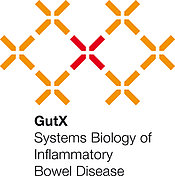GutX
Systems Biology of Inflammatory Bowel Disease
Microorganisms in the lower intestine help us digest our food and even produce vitamins for our use. But some people cannot get on very well with these little helpers. The immune systems of patients with inflammatory bowel disease (IBD) attack the gut microorganisms that cause no problems for most healthy people. Researchers on the GutX MRD Project aim to find out what actually happens in the lower intestine, and hope to improve the understanding of the mechanisms causing the illnesses in order to find new treatment options.
Even when we are healthy, our bodies carry over a hundred thousand billion microbes on the skin and mucous membranes. In other words, our bodies consist of ten times more microbes than cells of our own! Most of these are located in the lower intestine, also called the large bowel or colon. These little passengers help us digest our food. They also produce vitamins and other molecules that keep us healthy, and stop other less friendly microbes from causing infections.
Immune cells fighting microorganisms
Unfortunately, not everyone can live in such harmony with their intestinal microbes. About one in 1000 people suffers from inflammatory bowel disease (IBD). These patients have repeated episodes of intestinal inflammation caused by immune cells in the lining of the intestine reacting aggressively to the microbes tolerated by most healthy people.
Most research in this area has so far concentrated on asking which of the thousands of potential microbes are present in the intestines of IBD patients? This, however, only tells us who is there, but not what they are doing. In the GutX MRD Project, the interdisciplinary research team will tackle the second issue. They will study how the intestinal microbes’ metabolism (meaning all of their biochemical reactions) affects patients’ mucous membranes and immune systems. Using methods that simultaneously measure many of the different biochemicals present in the intestinal contents, and following how these substances are passed from the bacteria onto the patient, the scientists will develop models to simulate how these processes function in health and disease.
The researchers will also tackle the problem that many IBD patients fail to respond well to currently available treatments. By understanding the biochemical processes that underlie the disease, the researchers hope to elucidate the reasons for the variation in severity of patients’ conditions, and provide rational insight into the disease as a basis for improving therapies.
| Principal Investigator | Prof. Dr. med. Andrew Macpherson, Gastroenterology & Mucosal Immunology, Inselspital, University of Bern |
| Involved Institutions | UniBE/Inselspital, ETHZ, SIB |
| Number of Research Groups | 4 |
| Project Duration | Jul. 2015 – Jun. 2018 |
| Approved SystemsX.ch Funds | CHF 2.369 million |
Updated June 2015


